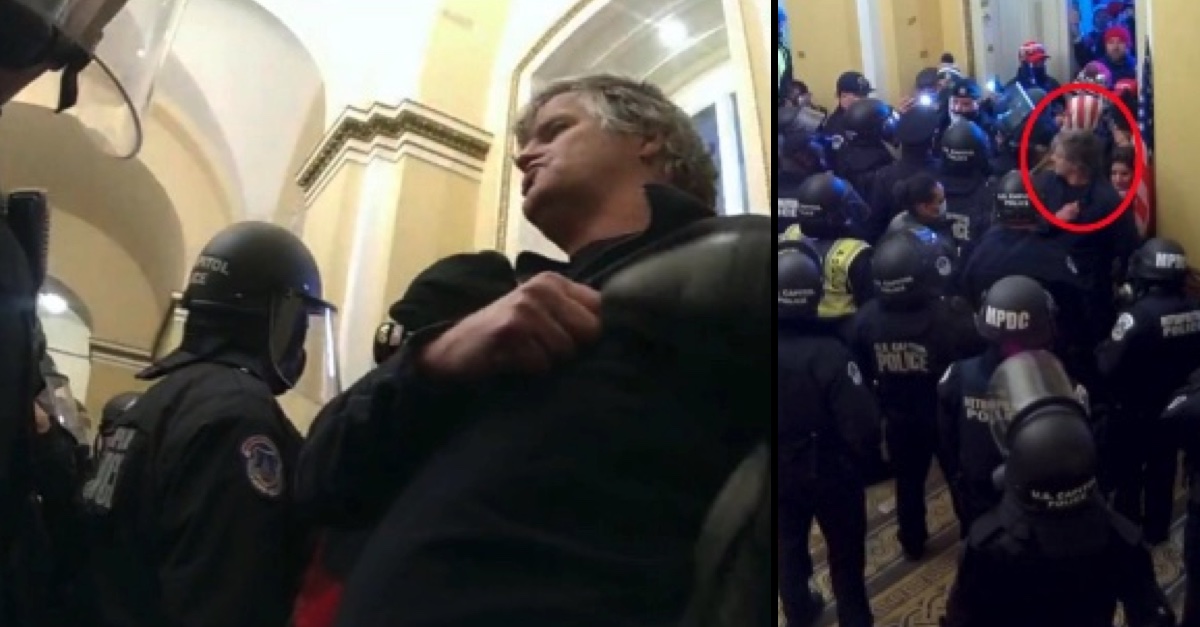
Mark Leffingwell confronts police at the U.S. Capitol on Jan. 6
Prosecutors are asking that a man who repeatedly punched police officers guarding the U.S. Capitol on Jan. 6 be sentenced to more than two years behind bars.
Mark Leffingwell, 52, admitted to punching two Capitol Police officers multiple times during a face-to-face confrontation on Jan. 6, when a mob of Donald Trump supporters breached the Capitol to stop Congress from certifying Joe Biden’s win in the 2020 presidential election.
“Leffingwell, a military veteran who once defended the Constitution from all enemies, foreign and domestic, willingly betrayed his nation and became an enemy of the United States on January 6,” prosecutors said in a sentencing memorandum filed Wednesday.
Prosecutors say that Leffingwell flew from his home in Seattle to Philadelphia, where he met up with a friend before driving down to Washington, D.C. for the events of Jan. 6.
He wasn’t among the first in the crowd to face off against police. In fact, prosecutors say, he and his friend had stopped for lunch after Trump’s so-called “Stop the Steal” rally before rejoining the crowd at the Capitol. By that time, the building “had already been assaulted by the first wave of several hundred violent rioters,” according to prosecutors.
Leffingwell made his way to the Senate Wing doors of the Capitol building, and positioned himself in front of a group of officers that had gathered to keep additional rioters from getting in to the building.
“As he stood at the front of the crowd of rioters behind him, Leffingwell chanted not only ‘stop the steal!’ but also ‘shame!’ and ‘join us!’ directed at the police officers standing in front of him,” the government’s sentencing memo says.
Leffingwell rejected calls from fellow rioters to back off.
“Appearing to respond to the pleas of the line of officers, some of the crowd began to call back to the rioters behind them to ‘back up!’ Rather than back up, Leffingwell called out for the rioters to stand their ground, shouting ‘If you back up, you’ll never get back in!’ At that point, the line of officers began pressing on the crowd, including Leffingwell, to back them out of the threshold of the Senate Wing doors. Leffingwell had a choice: either comply with the direction of the officers or fight back. He chose the latter.”
That’s when Leffingwell started swinging, according to prosecutors. He first punched Capitol Police Officer Daniel Amendola in the head, and then punched officer Wyatt Hart, also in the head. He then punched Amendola once more.
“Though his first punch met riot gear, he was undeterred, and kept punching until he was eventually pacified,” the prosecutors’ sentencing memo says.
Leffingwell then “tried to back out of the doors and into the safety of the sympathetic crowd behind him, but he was apprehended and taken to the ground,” prosecutors say in the memo.
Leffingwell pleaded guilty in October to one count of assaulting, resisting, or impeding police officers on Jan. 6.
The government has requested a sentence of 27 months in prison followed by three years of supervised release.
Prosecutors acknowledged Leffingwell’s lack of criminal history and relatively early admission of guilt as mitigating factors, but said that his military background, which would normally factor in his favor at sentencing, is actually a significant concern in this case:
“Leffingwell’s actions on January 6 were fundamentality antithetical to his military career, where he served first as a Marine and then as a National Guardsman, where he was wounded on duty. More than the average citizen, Leffingwell knew that allegiance to the United States of America takes precedent over allegiance to any political party or any one person. When he donned his military uniforms with American flag patches in hostile territory, he used the training he had received to serve as a defender of the whole United States, not just of people belonging to one ideology or who just aligned with his way of thinking. To assault the United States Capitol, a beacon of democracy for all Americans, is a shameful dereliction of duty to the country he has served.”
Prosecutors also said that while the government is sympathetic to injuries Leffingwell suffered while on duty, particularly a neurological condition that he says was exacerbated by a 2008 attack in Iraq, his injuries didn’t stop him from traveling across the country to Washington, where he “willingly pushed against a police line, and then punched two separate Capitol Police Officers.”
“[N]othing suggests that those conditions accounted for any of his conduct on January 6,” the government said in the sentencing memo.
Prosecutors’ request for 27 months behind bars is shorter than other Jan. 6 defendants who have been sentenced for assaulting police officers. It would place Leffingwell at the lower end of the four Jan. 6 defendants who have already been sentenced for assaulting police at the Capitol. Scott Fairlamb, who punched a police officer in the face, was sentenced to 41 months; Robert Scott Palmer, who repeatedly assaulted police with a wooden plank and then sprayed officers with a fire extinguisher was sentenced to 63 months. Devlyn Thompson assaulted an officer with a police baton and was sentenced to 46 months behind bars, and Nicholas Languerand threw sticks and a traffic bollard at police and was sentenced to 44 months.
Pursuant to the plea agreement, Leffingwell will pay $2,000 in restitution for damage done to the Capitol.
Leffingwell’s sentencing hearing is set for Feb. 10 at 2:00 p.m. before U.S. District Judge Amy Berman Jackson, a Barack Obama appointee.
Read the government’s sentencing memorandum below.
[Images via FBI]